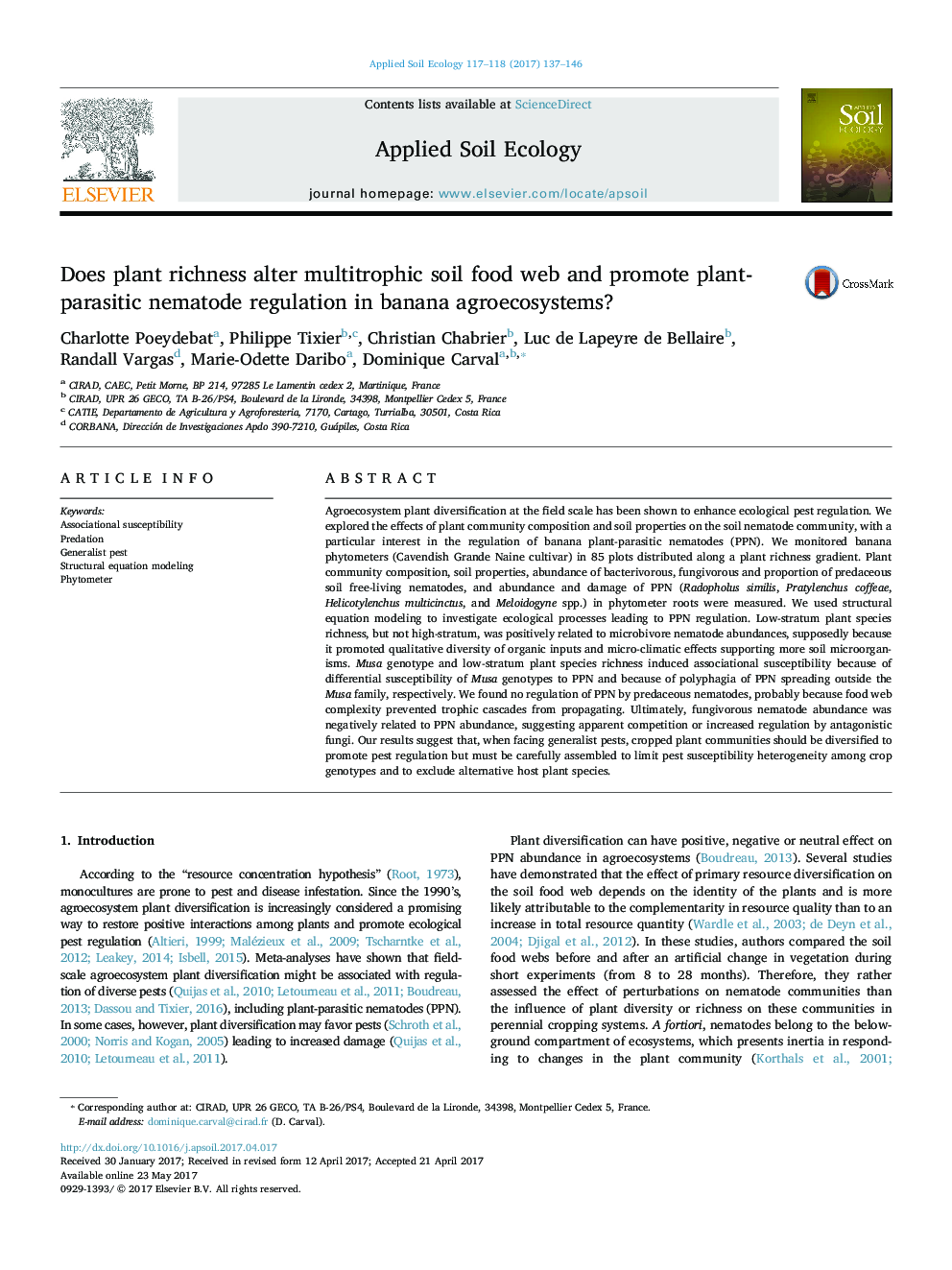| کد مقاله | کد نشریه | سال انتشار | مقاله انگلیسی | نسخه تمام متن |
|---|---|---|---|---|
| 5742671 | 1617766 | 2017 | 10 صفحه PDF | دانلود رایگان |
عنوان انگلیسی مقاله ISI
Does plant richness alter multitrophic soil food web and promote plant-parasitic nematode regulation in banana agroecosystems?
ترجمه فارسی عنوان
آیا غنای گیاهی باعث تغییر مواد غذای چندتروفی خاک می شود و تنظیم مقررات نماتدی انگلی گیاهی را در سیستم های آسیایی موز گسترش می دهد؟
دانلود مقاله + سفارش ترجمه
دانلود مقاله ISI انگلیسی
رایگان برای ایرانیان
کلمات کلیدی
حساسیت به انجمن پیشگویی، آفات عمومی مدل سازی معادلات ساختاری، فیتومتر،
موضوعات مرتبط
علوم زیستی و بیوفناوری
علوم کشاورزی و بیولوژیک
بوم شناسی، تکامل، رفتار و سامانه شناسی
چکیده انگلیسی
Agroecosystem plant diversification at the field scale has been shown to enhance ecological pest regulation. We explored the effects of plant community composition and soil properties on the soil nematode community, with a particular interest in the regulation of banana plant-parasitic nematodes (PPN). We monitored banana phytometers (Cavendish Grande Naine cultivar) in 85 plots distributed along a plant richness gradient. Plant community composition, soil properties, abundance of bacterivorous, fungivorous and proportion of predaceous soil free-living nematodes, and abundance and damage of PPN (Radopholus similis, Pratylenchus coffeae, Helicotylenchus multicinctus, and Meloidogyne spp.) in phytometer roots were measured. We used structural equation modeling to investigate ecological processes leading to PPN regulation. Low-stratum plant species richness, but not high-stratum, was positively related to microbivore nematode abundances, supposedly because it promoted qualitative diversity of organic inputs and micro-climatic effects supporting more soil microorganisms. Musa genotype and low-stratum plant species richness induced associational susceptibility because of differential susceptibility of Musa genotypes to PPN and because of polyphagia of PPN spreading outside the Musa family, respectively. We found no regulation of PPN by predaceous nematodes, probably because food web complexity prevented trophic cascades from propagating. Ultimately, fungivorous nematode abundance was negatively related to PPN abundance, suggesting apparent competition or increased regulation by antagonistic fungi. Our results suggest that, when facing generalist pests, cropped plant communities should be diversified to promote pest regulation but must be carefully assembled to limit pest susceptibility heterogeneity among crop genotypes and to exclude alternative host plant species.
ناشر
Database: Elsevier - ScienceDirect (ساینس دایرکت)
Journal: Applied Soil Ecology - Volumes 117â118, September 2017, Pages 137-146
Journal: Applied Soil Ecology - Volumes 117â118, September 2017, Pages 137-146
نویسندگان
Charlotte Poeydebat, Philippe Tixier, Christian Chabrier, Luc de Lapeyre de Bellaire, Randall Vargas, Marie-Odette Daribo, Dominique Carval,
